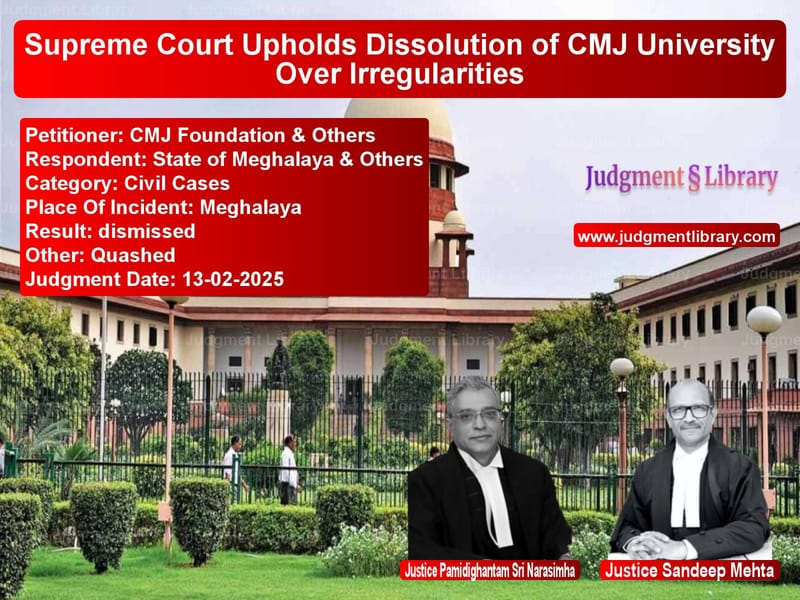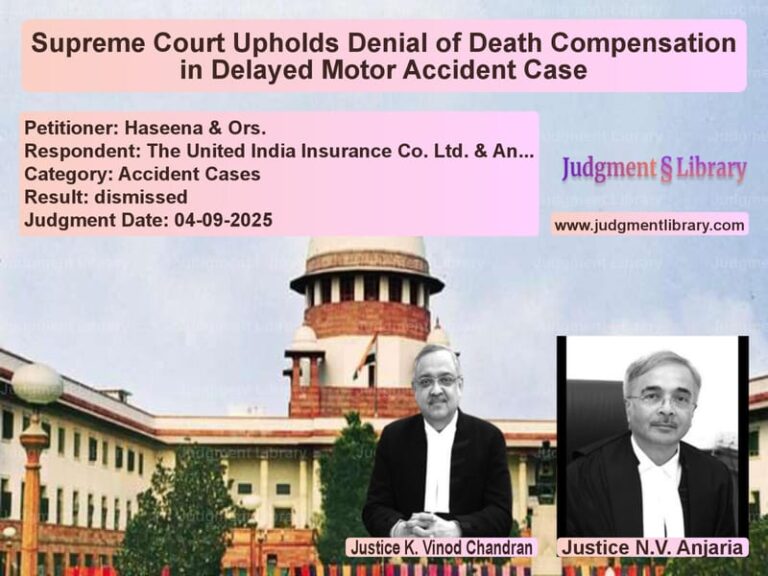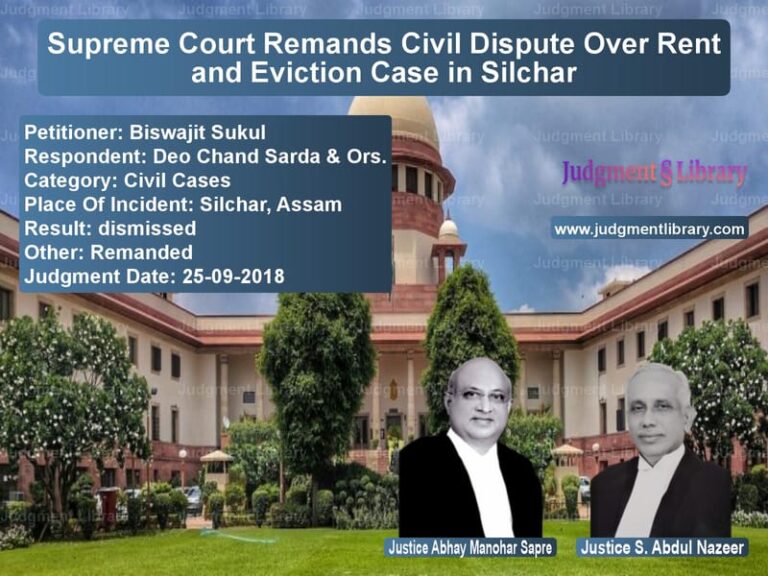Supreme Court Upholds Dissolution of CMJ University Over Irregularities
The Supreme Court of India recently ruled in CMJ Foundation & Ors. vs. State of Meghalaya & Ors., upholding the dissolution of CMJ University by the Meghalaya government due to serious irregularities and violations of statutory provisions. The judgment clarifies the scope of government oversight on private universities, emphasizing adherence to statutory procedures in higher education institutions.
The case arose from the Meghalaya government’s decision to dissolve CMJ University on March 31, 2014, citing violations in governance, unapproved appointments, unauthorized degree programs, and failure to meet statutory educational standards. CMJ University challenged the dissolution order, leading to prolonged litigation that reached the Supreme Court.
Background of the Case
CMJ University was established under the CMJ University Act, 2009, enacted by the Meghalaya Legislative Assembly to promote higher education in multiple disciplines. However, disputes emerged regarding the legality of its functioning, particularly the appointment of its Chancellor, governance issues, and regulatory compliance.
The key facts of the case:
- CMJ University was established by the CMJ Foundation in 2009, with Chander Mohan Jha appointed as Chancellor without the statutory approval of the Visitor (Governor of Meghalaya).
- The Meghalaya government issued a notice on April 30, 2013, highlighting violations such as unauthorized appointments, improper Ph.D. degree awards, and the operation of illegal off-campus centers.
- The University ignored regulatory directives, prompting the State to dissolve CMJ University via an order dated March 31, 2014.
- The High Court initially set aside the dissolution order, leading to an appeal by the State.
- The Division Bench of the High Court upheld the dissolution but remanded the matter to the Single Judge for reconsideration.
- CMJ Foundation appealed the dissolution, while the State challenged the remand order, leading to the present Supreme Court ruling.
Legal Issues Considered
The Supreme Court examined several crucial legal questions:
- Whether the appointment of CMJ University’s Chancellor followed statutory procedures.
- Whether the Meghalaya government properly adhered to Section 48 of the CMJ University Act, 2009 in dissolving the University.
- Whether the High Court was justified in remanding the matter for reconsideration after affirming the dissolution.
Arguments by the Appellant (CMJ Foundation)
CMJ Foundation, through its legal representatives, argued:
- The University had invested substantial resources in establishing infrastructure, including classrooms, laboratories, and libraries, with the approval of regulatory authorities.
- The appointment of the Chancellor was valid since no objections were raised despite repeated requests for approval.
- The doctrine of deemed approval should apply as the Visitor (Governor) failed to respond within a reasonable time.
- The State’s actions were arbitrary and violated principles of natural justice, as the University was not given adequate time to rectify any alleged deficiencies.
- The dissolution order failed to meet procedural safeguards outlined in Section 48 of the CMJ University Act.
Arguments by the Respondent (State of Meghalaya)
The Meghalaya government defended its decision, arguing:
- The appointment of the Chancellor was invalid as it lacked statutory approval, making all subsequent actions of the University void.
- CMJ University engaged in serious irregularities, including awarding Ph.D. degrees without proper faculty and setting up unauthorized off-campus centers.
- The dissolution order followed due process, with show-cause notices and multiple opportunities for the University to present its case.
- The doctrine of deemed approval did not apply, as government approval is a mandatory requirement under Section 14(1) of the CMJ University Act.
- The High Court was incorrect in remanding the case, as the dissolution order was procedurally valid and legally justified.
Supreme Court’s Observations
The Supreme Court examined the legality of the Chancellor’s appointment, the adherence to due process in the dissolution order, and the appropriateness of the High Court’s remand order.
On the Appointment of the Chancellor
“The appointment of the Chancellor under Section 14(1) of the CMJ University Act was subject to the approval of the Visitor. The failure to secure such approval renders the appointment void and all actions taken under the purported authority of the Chancellor legally invalid.”
On the Validity of the Dissolution Order
“The Meghalaya government followed due process by issuing show-cause notices and granting an opportunity to CMJ University to respond. The failure to comply with statutory directions justified the dissolution of the University under Section 48(2) of the Act.”
On the High Court’s Remand Order
“Once the High Court upheld the procedural validity of the dissolution, remanding the case for further consideration was unnecessary. The Division Bench erred in directing reconsideration of an issue that had already been conclusively determined.”
Final Judgment
The Supreme Court ruled:
- The appointment of CMJ University’s Chancellor was legally invalid.
- The Meghalaya government correctly followed Section 48 of the CMJ University Act in dissolving the University.
- The High Court was incorrect in remanding the case for reconsideration.
- The dissolution order dated March 31, 2014 was upheld.
Conclusion
The Supreme Court’s ruling affirms key legal principles:
- Government oversight of private universities: Regulatory compliance is essential, and universities must adhere to statutory norms.
- Appointment procedures must be strictly followed: A university’s governance structure must comply with legislative requirements.
- Proper administrative procedures in dissolution cases: The government must follow due process before dissolving an institution.
By upholding the dissolution of CMJ University, the Supreme Court has reinforced accountability in higher education governance and established a precedent for addressing regulatory violations in private universities.
Petitioner Name: CMJ Foundation & Others.Respondent Name: State of Meghalaya & Others.Judgment By: Justice Pamidighantam Sri Narasimha, Justice Sandeep Mehta.Place Of Incident: Meghalaya.Judgment Date: 13-02-2025.
Don’t miss out on the full details! Download the complete judgment in PDF format below and gain valuable insights instantly!
Download Judgment: cmj-foundation-&-oth-vs-state-of-meghalaya-&-supreme-court-of-india-judgment-dated-13-02-2025.pdf
Directly Download Judgment: Directly download this Judgment
See all petitions in Education Related Cases
See all petitions in Contract Disputes
See all petitions in Judgment by P.S. Narasimha
See all petitions in Judgment by Sandeep Mehta
See all petitions in dismissed
See all petitions in Quashed
See all petitions in supreme court of India judgments February 2025
See all petitions in 2025 judgments
See all posts in Civil Cases Category
See all allowed petitions in Civil Cases Category
See all Dismissed petitions in Civil Cases Category
See all partially allowed petitions in Civil Cases Category







